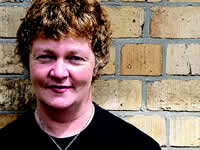Resilient Auckland festival takes on a life of its own
 Richard Liddicoat spoke with artistic director for the Auckland Writers and Readers Festival Jill Rawnsley. She shares the challenges of staging a landmark literary festival in a small arts organisation, and her strong desire to inspire youth.
Richard Liddicoat spoke with artistic director for the Auckland Writers and Readers Festival Jill Rawnsley. She shares the challenges of staging a landmark literary festival in a small arts organisation, and her strong desire to inspire youth.
Jill Rawnsley is in philosophical mood when we speak — the Auckland Writers and Readers Festival artistic director had just heard about the cancellation of one of the drawcards — Eat, Pray, Love author Elizabeth Gilbert — and was dealing with the aftermath.
“That’s life,” she says, without even a hint of closed teeth.
It was a major blow, the sort of thing that might sink a smaller festival. In its tenth year the Auckland festival is resilient enough to survive not only the loss of popular author Gilbert, but changes in dates and times brought on through all kinds of events.
“Jennifer Sturm was in South America when I was trying to confirm the programme. Communications weren’t great — just the odd text. She just got out of Chile ahead of the earthquake, and after the programme was printed there was a change … these things happen.”
 Creating life-changing moments
Creating life-changing moments
The festival this year is centred around ‘stories that deserve a life of their own; the stories that people dedicate their lives to telling.’ It’s apt — Rawnsley has been part of the festival for ten years — and has dedicated much of her life to making the event the landmark literary event that it is. The festival is about creating a community and connecting with people's lives, Rawnsley says.
“The last couple of years I haven’t had anyone complain that there were too many options. They used to say that, until they got used to the way it worked. It’s frustrating for people that they can’t be in two places at once.
“That’s the thing about a festival – if you don’t have lots of choice and lots of diversity its not really a festival.”
The event is made successful because over the years so many people have dedicated time and energy to it, Rawnsley says.
“There’s an awful lot of generosity that makes an event like this work, and I hope we never forget that — how many people have made a difference to whether it lived or died. It’s a really lovely atmosphere.”
Strong schools programme
The schools programme is perhaps the strongest part of the festival this year — many of the authors write for teens.
“It’s probably partly because I have children of my own, but its also to do with my own experience as a younger person, particularly when I hit the age of 11, 12. I really struggled to get inspired by books, which to me was just bizarre. I’d read so much and loved reading — it was a combination of hormones and difficult things happening in your life — I couldn’t find the books that I needed.
“I wanted kids to have the opportunity to come a long and go ‘Oh My God!”
“One of the most wonderful moments for me last year was walking up the aisle behind some kids leaving an event and hearing one of them say ‘I wanna be a writer’. Not ‘I want to be an All Black’. It just warmed my heart.”
Staying relevant in a changing world
Rawnsley is determined to help as many people as possible make a personal connection with literature that is relevant to their lives.
“I was shocked last year when I went out to schools to find that English was no longer a compulsory subject. It didn’t even occur to me that it had become optional. Some of the teachers said it was great I was doing this. The kids don’t take English because they don't think there's anything exciting … there’s no trips …”
“I wanted to see some connection with the theatre of literature, if you like…”
“The whole reason the festival started off was because there really weren’t that many opportunities for New Zealand writers to appear in front of their reading public. Things have changed a lot, even in the last three or four years. In Auckland there’s a lot more writers events now — at the museum, the art gallery — there’s lots going on. It’s not unusual anymore.”
Behind the scenes changes
Life has been busy for Rawnsley and the festival team, with some major changes to the organisation behind the scenes. Rawnsley resigned as festival director last year and has taken on the role of artistic director. She concentrates on the programming and the writers, and the commercial sponsorships, and day to day management of the festival has been handed over to a capable team. The change is one she’s enjoying.
“In a small arts organisation you don’t have an IT person, and office manager… often those things would fall to me. I’ve divorced myself from that as much as I can.”
The festival is a mammoth feat of logistics, carried out by a small paid staff, sponsors generosity, lots of volunteers and goodwill. And the public turn out in their thousands.
“We’ve got a new production manager this year who’s worked for New Zealand Ballet and Auckland Theatre company — some big companies — and even she, I think, has been a bit surprised at the magnitude of it.”
“It looks very simple on paper. But the plain fact of the matter is that it’s a constant all day event with more than one thing going on at a time. You have to be incredibly organised and volunteers organisation is a big job. Thank God we have so many wonderful people who help us out every year.”
May 2010

